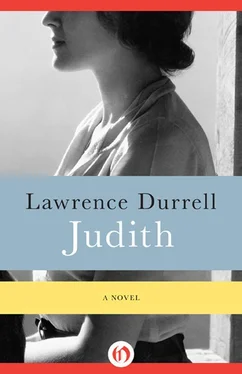A sudden twist in events disabused her of this idea, and replaced it by an even more alarming one, namely: that she had no right to meddle with the affections of David. It came about in the following manner — preceded by an hysterical attack as unexpected as it was unwelcome.
One of the smallest of the children fell out of an apple tree and hurt itself. This type of incident was common enough, and her reaction seemed out of all proportion to its seriousness. Or was it simply the desperate screaming of the word “Mother!” (Hebrew: “Imma!”). At any rate, Grete took the sobbing child in her arms and found herself cradling it, to still its crying, murmuring as she did so her old German nurse’s lullaby, the words of which she had last recalled singing to sleep her own child: “Schlafe süss… Gradually, as she cradled the child, the swinging movements became mechanical. Her mind seemed to have left her with her feelings alone. The child was quiet now, gazing at her curiously. She stared open-eyed into the void with unfocussed eyes. She continued like a monomaniac, rocking and staring, rocking and staring. The child in her arms suddenly took fright, aware in an obscure way of something abnormal in her behaviour, and started to scream out in terror. Instantly, the fear was communicated to the other children around her, and the panic spread. Some babies began to cry too.
There is no knowing how long Grete would have gone on, fixed in this posture of mad concentration. She suddenly felt the hand of Rose on her shoulder, and heard the firm voice admonishing her. Rose gently released the child and took Grete’s arm:
“Come along,” she said softly, under her breath, and Grete obeyed like a sleepwalker. Once in her room, however, she broke down and lay on her bed, crying convulsively. Rose watched her compassionately for a moment or two, and then forced her to take a tranquillizer.
“I’ll go and tell Pete.”
But in fact it was not Peterson who next appeared beside her bed, but David himself. Unbelievably, she heard the concern in his deep voice as he came to the side of her bed.
“For God’s sake, Grete, what is it?”
She glanced wildly at him, and then turned her face to the wall, ashamed that he should see her at a disadvantage, weeping. He knelt down beside the bed, quietly and purposefully put a hand upon her shoulder, turning her towards him. He spoke now in a whisper:
“My goodness, how little you understand,” he said. “Grete, Grete, wake up,” and he shook her softly, like a doll.
She gazed at him with a wild beseeching fear in her eyes.
“Please go away,” she said, but his only answer was to draw her towards him, and start stroking her, as if to soothe her. Somehow a barrier had been crossed. She lay in his arms without defence, helpless, broken and incapable of response. For his part he was astonished by the depth of misery and confusion into which she was plunged. He stared into her wide eyes and whispered once more:
“What is it?”
“Don’t you pity me!” she cried out, pushing him from her.
“I’m not, you fool!” he almost shouted, shaking her with both arms and pinning her down. She did not move, but still stared at him as if she were trying to drag every shred of meaning from his face. Then, with a sudden low moan, she pressed her mouth to his, kissing him almost brutally, as if each kiss were a stab wound delivered or received.
The act of becoming lovers, the thought of which had so terrified her, was quite different from anything she could have imagined. All the pangs of conscience, all the confusions and disorders of her psyche, were suddenly purged by his deliberate passionate embraces. It was only when they once more lay side by side, eye to eye and mouth to mouth in the darkness, that she was overwhelmed by terror and her mind threw up once again the frightening gallery of human portraits which had tormented her for so long. Like a masquerade they came and went, those brutal denizens of the Lager. She suddenly realized that she had taken an irrevocable step, and the thought was like a pistol shot fired in her brain. She sat up and said in a tone of surprise, almost:
“I must go away.”
He did not hear the words, but turned lazily on his elbow to study her face, touching its features with his forefinger, studying it with a passionate intensity.
All at once they caught the noise of footsteps on the asphalt outside the house, and they heard the familiar cough of Peterson. In a flash he was at the door. Peterson stood on the threshold outside.
“What are you doing here, David?” she asked in a low voice. But he passed her without a word, and walked away into the dusk.
Peterson took one step forward and tapped with a knuckle on the door. If she suspected anything, her features did not betray it. She stood smiling at Grete, who looked up at her with a new intensity on her face, hugging her knees with her arms.
“I’m going away, Pete,” she said. “I’ve come to a decision.”
Peterson seemed quite unmoved by this declaration. She groped for her cigarette-holder and fitted a cigarette into it, asking with elaborate casualness:
“Are you going because you are in love, or because you’re not in love?”
“This evening has decided everything. I took a step against my better judgment. There is no going forward for me now.”
“Has David no stake in the matter?” asked Peterson dryly.
“He does not know anything about me.”
“Well, he knows all that I told him,” said Peterson. The girl turned her troubled eyes on the older woman and asked:
“Even about…?”
Peterson nodded curtly.
In a sudden gust of shame, Grete put her hands to her cheeks.
“Oh, Pete!” she exclaimed. “Can’t you see that it wouldn’t work! And besides, David himself is a married man with a child!”
“On the contrary, he’s a widower.”
Grete paused for a brief moment, refusing the immediate delight of that knowledge, then suddenly flung herself on her knees beside Peterson, and said:
“Oh, don’t try to talk me out of it. You know I must leave, so please help me go. I suppose Rose has told you what happened.”
“Well,” said Peterson. “If that’s what you really want, I could help you if you wish. I could try and find you a job in Jerusalem. When do you want to go?”
Pete reflected for a moment. “Jerusalem is not very far, you know,” she said. “Which may be all to the good in the long run. I mean if David should wish to get in touch with you.”
Grete made a gesture of furious impatience.
“I would like to go back to Europe,” she said. “Oh why were we Jews born so unlucky!”
“Speak for yourself,” said Peterson. “As for me, I’m not a Jew but I can’t say that I’ve been conspicuously luckier than one.”
“Then what are you doing here?” asked Grete.
“I have become one by choice,” said Peterson with a grin. “I was in love with one, once. He was a great man. He always suffered from a feeling of persecution, of self-contempt, and yet was proud of his country. When the real persecution started in Germany he was dead. By the way,” she went on, “this is in confidence. Only one other person knows this here, and I don’t want it to spread. Like you, I dislike being pitied.”
Grete touched her hand softly and gave it a sympathetic squeeze.
“Now sleep,” said Pete, “and tomorrow you will be in Jerusalem. We’ll try and find you a job to do.”
They parted, and Grete lay for a long time with her eyes wide open in the darkness, her mind full of plans and self-reproaches. She was afraid that David would come back and weaken her resolve, and she was genuinely grateful, when she heard the clock strike four, that he had not put in an appearance.
Читать дальше












